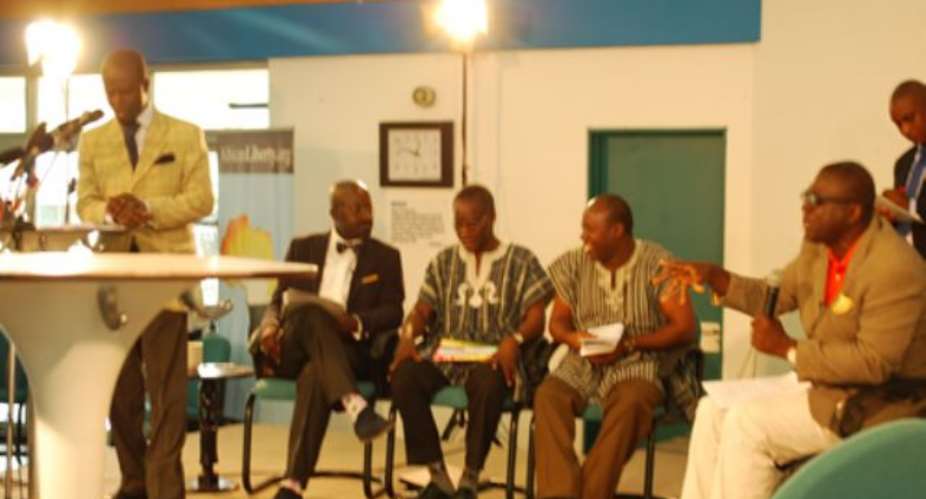Two of Ghana's astute lawyers on Friday turned the British Council Hall in Accra into another courtroom to debate, with the help of witnesses, why and why not government should subsidise anything.
Subsidy is an incentive; a requirement government has to undertake in order to fulfill its constitutional mandate of wiping away poverty, argued Nana Asante Bediatuo, a former Wall Street legal luminary and international banking advisor.
On the contrary, subsidy is nothing more than a handout which only serves to deepen the psyche of dependency and to breed laziness among the populace, Ernest Kofi Abotsi, a law lecturer at the Kwame Nkrumah University of Science and Technology retorted.
The two lawyers were principal advocates in a national debate organized by IMANI Centre for Policy and Education in collaboration with the World Bank.
It was on the topic “Subsidies are required now for Ghana's Development.”
Nana Bediatuo, advocate for the motion argued vehemently that government as part of its social contract with the people is morally inclined to offer incentives or subsidies to the less privileged in the society.
Quoting articles 15, 17, and other sections of the 1992 constitution of Ghana which clearly spells out the rights of citizens, Nana Bediatuo eloquently stated, by not subsidizing fuel, farmers, education, government will be shirking its responsibilities to the larger number of the citizens who elected them into office.
His first witness, Kingsley Ofei-Nkansah, General Secretary of the Agricultural Workers Union of the Ghana TUC, in support of citizen's right to subsidy, said farmers would have been worse off without subsidy.
Subsidy, he argued does not only reduce cost of production but increases agricultural production. He maintained farmers provided with fertilizers as a form of subsidy in the country do better than their opponents without the fertilizer.
But in a cross examination, Mr. Ernest Abotsi, advocate against the motion debunked the assertion of the witness.
Asked if the current amount given farmers as subsidy was enough to undertake any productive venture, Mr Ofei-Nkansah admitted it was not enough but added, rather swiftly, the situation would have been worse without it.
"Between the paltry subsidy and access to cheap credit, which would you prefer?" Abotsi probed.
Mr. Ofei Nkansah said he would prefer the latter, an answer which drew laughter from the crowd, mostly made up of journalists, businessmen and politicians.
Mr. Abotsi argued that subsidies are no panacea to the poverty of farmers as the first witness and his chief advocate Nana Bediatuo would have the world believe.
He cited the lack of market access, post harvest losses, general lack of appreciation of farmer's contributions to the economy as greater evil.
The second witness for the motion, Augustine Adongo, a leading business development specialist, touted the National Health Insurance Scheme, Student loan as examples of subsidies- ones that he benefited from, saying the citizens are better off with subsidy.
But Abotsi dismissed the claim. He argued the success of NHIS is contingent on the availability of health centres. And in a country with limited number of hospitals and health care facilities it is not prudent to invest in NHIS he opined.
On his substantive arguments, Mr Ernest Abotsi said subsidy is only an ideal situation. In reality, subsidy is not pro poor. In fact the poor ends up poorer under a regime of subsidy, he said.
He argued when fuel is subsidized it is not the poor farmer or the passenger who benefits but the rich businessman who drives in the latest fuel consuming luxury vehicle.
According to him, countries and other international organizations the world over are beginning to walk away from all forms of subsidy because it is counter-productive.
In a country where there is no regulation, monitoring and oversight responsibility by government, Mr Abotsi said it is suicidal for Ghana to dole out 'handouts' in the name of helping the poor.
His first witness Kweku Agyemang-Duah, an entrepreneur said subsidies 'kills' initiative from business men. He would rather have government concentrate on its core duties and invest in productive ventures.
In a cross examination, Mr Duah admitted being a beneficiary of subsidy but said it did little or nothing to improve his business.
The second witness Roland Akosah, also a business man argued monies wasted on subsidies could have been diverted into the production of biofuel.
But Nana Bediatuo objected to that argument saying failure to produce biogas cannot be attributed to the payment of subsidies but rather the competition to grow food crops on the same land.
Even though no clear winner was adjudged, Papa Kow Acquaye, head of research for Joy FM and the moderator of the debate, like many of the audience present were left in two minds.
Former GIPC boss Ahomka Lindsay rather advocated for a 'target' subsidy.
Story by Nathan Gadugah/Myjoyonline





 We’ll no longer tolerate your empty, unwarranted attacks – TUC blasts Prof Adei
We’ll no longer tolerate your empty, unwarranted attacks – TUC blasts Prof Adei
 Bawumia donates GHc200,000 to support Madina fire victims
Bawumia donates GHc200,000 to support Madina fire victims
 IMF to disburse US$360million third tranche to Ghana without creditors MoU
IMF to disburse US$360million third tranche to Ghana without creditors MoU
 Truck owner share insights into train collision incident
Truck owner share insights into train collision incident
 Paramount chief of Bassare Traditional Area passes on
Paramount chief of Bassare Traditional Area passes on
 Two teachers in court over alleged illegal possession of BECE papers
Two teachers in court over alleged illegal possession of BECE papers
 Sunyani: Victim allegedly shot by traditional warriors appeals for justice
Sunyani: Victim allegedly shot by traditional warriors appeals for justice
 Mahama vows to scrap teacher licensure exams, review Free SHS policy
Mahama vows to scrap teacher licensure exams, review Free SHS policy
 Government will replace burnt Madina shops with a new three-story, 120-store fac...
Government will replace burnt Madina shops with a new three-story, 120-store fac...
